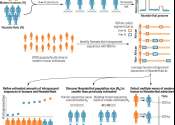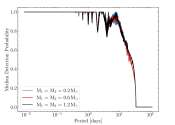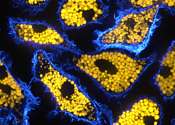Earth Sciences
Unprecedented warming threatens Earth's lakes and their ecosystems
Lakes, with their rich biodiversity and important ecological services, face a concerning trend: rapidly increasing temperatures. A recent study published in Nature Geoscience by an international team of limnologists and climate ...
just added
0
0
Evolution
Insight into one of life's earliest ancestors revealed in new study
An international team of researchers led by the University of Bristol has shed light on Earth's earliest ecosystem, showing that within a few hundred million years of planetary formation, life on Earth was already flourishing.
just added
0
0

Neutrons are a hot new way to measure the temperature of electronic components
From LEDs to batteries, our lives are full of electronics, and there is a constant push to make them more efficient and reliable. But as components become increasingly sophisticated, ...
From LEDs to batteries, our lives are full of electronics, and there is a constant push to make them more efficient and reliable. But as components become ...
General Physics
just added
0
0

Methane flux in North Sea varies with tides, study shows
Methane, a strong greenhouse gas that naturally escapes from the bottom of the North Sea, is affected by the pressure of high or low tide. Methane emissions from the sea floor can ...
Methane, a strong greenhouse gas that naturally escapes from the bottom of the North Sea, is affected by the pressure of high or low tide. Methane emissions ...
Environment
just added
0
0

A better way to make RNA drugs: Enzymatic synthesis method expands capabilities while eliminating toxic byproducts
While the COVID-19 vaccines introduced many people to RNA-based medicines, RNA oligonucleotides have already been on the market for years to treat diseases like Duchenne Muscular Dystrophy ...
While the COVID-19 vaccines introduced many people to RNA-based medicines, RNA oligonucleotides have already been on the market for years to treat diseases ...
Biotechnology
just added
0
0

Real-life 'stillsuit': Dune-inspired upgrade for spacesuits allow astronauts to recycle urine into water
Astronauts on spacewalks famously have to relieve themselves inside their spacesuits. Not only is this uncomfortable for the wearer and unhygienic, it is also wasteful, as—unlike wastewater on board the International Space ...
Space Exploration
4 hours ago
0
1

'A history of contact': Geneticists are rewriting the narrative of Neanderthals and other ancient humans
Ever since the first Neanderthal bones were discovered in 1856, people have wondered about these ancient hominins. How are they different from us? How much are they like us? Did our ancestors get along with them? Fight them? ...
Evolution
14 hours ago
0
159

Physicists suggest tachyons can be reconciled with the special theory of relativity
Tachyons are hypothetical particles that travel at speeds greater than the speed of light. These superluminal particles, are the "enfant terrible" of modern physics. Until recently, they were generally regarded as entities ...
Quantum Physics
17 hours ago
5
415

Theoretical physicists find Higgs boson does not seem to contain any harbingers of new physics
The Higgs boson was discovered in the detectors of the Large Hadron Collider a dozen or so years ago. It has proved to be a particle so difficult to produce and observe that, despite the passage of time, its properties are ...
General Physics
17 hours ago
1
171

Scientific definition of a planet says it must orbit our sun: A new proposal would change that
Planetary scientists are proposing a new definition of a planet to replace one that many researchers view as sun-centric and outdated. The current definition—established in 2006 by the International Astronomical Union (IAU), ...
Planetary Sciences
12 hours ago
6
208

New research reveals how galaxies avoid early death
Galaxies avoid an early death because they have a "heart and lungs" which effectively regulate their "breathing" and prevent them from growing out of control, a new study suggests.
Astronomy
10 hours ago
0
44

Astronomers discover dozens of double-lined double white dwarf binaries
An international team of astronomers reports the discovery of 34 rare double-lined double white dwarf binary systems using the Intermediate-dispersion Spectrograph and Imaging System (ISIS) on the William Herschel Telescope ...

Q&A: Researchers discuss cellular inflammation uncovered in rare neurodegenerative condition
Researchers at The Hospital for Sick Children (SickKids) have found that inflammation in an immune cell may be responsible in part for some severe symptoms in a group of rare genetic conditions called lysosomal storage diseases ...
Immunology
just added
0
0

The Future is Interdisciplinary
Find out how ACS can accelerate your research to keep up with the discoveries that are pushing us into science’s next frontier
 Medical Xpress
Medical Xpress

Study finds men and women process memory in different ways

Nasal spray found to clear tau proteins from Alzheimer's mouse model brains

Association found between prenatal exposure to ambient air pollution and cerebral palsy

Nearly 1 in 10 pregnant people who get COVID will develop long COVID, study finds

Migraine pain caused by lack of lymphatic system drainage in brain, study suggests
 Tech Xplore
Tech Xplore

When to trust an AI model: New approach can improve uncertainty estimates

Battery innovation could boost power delivery for electric aircraft

Study finds health risks in switching ships from diesel to ammonia fuel

Using sodium to make more sustainable batteries

Hydrogen flight looks ready for take-off with new advances

Library of operating data enables analysis of complex electric grid

Musk's Neuralink eyes more test subjects for its brain tech

China building more wind, solar capacity than rest of world combined: report

AI accessibility? Blind gamer puts ChatGPT to the test

Promising material for solar energy gets its curious boost from entropy, researchers show

Team develops the first cell-free system in which genetic information and metabolism work together
The capacity of all living systems to develop, organize and sustain themselves is based upon a cyclical process in which genes and metabolism interact in parallel. While genes encode the components of metabolism, metabolism ...
Biotechnology
13 hours ago
0
67

Oxygen tweaking may be key to accelerator optimization
Particle accelerators are pricey, but their cost comes with good reason: These one-of-a-kind, state-of-the-art machines are intricately designed and constructed to help us solve mysteries about what makes up our universe. ...
General Physics
11 hours ago
0
60

A stealth fungus has decimated North American bats, but scientists may be a step closer to treating white-nose syndrome
An invasive fungus that colonizes the skin of hibernating bats with deadly consequences is a stealthy invader that uses multiple strategies to slip into the small mammals' skin cells and quietly manipulate them to aid its ...
Plants & Animals
11 hours ago
0
34

Study introduces lead-coated nickel catalyst for enhanced hydrogen evolution reaction efficiency
In a recent collaboration, a research team developed a hydrogen evolution reaction catalyst that minimizes degradation caused by reverse current in alkaline water electrolysis systems.
Analytical Chemistry
12 hours ago
0
63

Forest carbon storage has declined across much of the Western U.S., likely due to drought and fire
Forests have been embraced as a natural climate solution, due to their ability to soak up carbon dioxide from the atmosphere as they grow, locking it up in their trunks, branches, leaves, and roots. But a new study confirms ...
Earth Sciences
12 hours ago
0
14

Muscle machine: How water controls the speed of muscle contraction
The flow of water within a muscle fiber may dictate how quickly muscle can contract, according to a University of Michigan study.
General Physics
15 hours ago
1
154

Q&A: Researcher discusses how gravitational waves hint at dark matter and Big Bang mysteries
Gravitational waves, ripples in space-time predicted by Einstein almost a century ago, were detected for the first time in 2015. A new study led by Yanou Cui, an associate professor of physics and astronomy at the University ...
Astronomy
13 hours ago
1
136

Reasoning skills of large language models are often overestimated, researchers find
When it comes to artificial intelligence, appearances can be deceiving. The mystery surrounding the inner workings of large language models (LLMs) stems from their vast size, complex training methods, hard-to-predict behaviors, ...
Computer Sciences
12 hours ago
0
11

When to trust an AI model: New approach can improve uncertainty estimates
Because machine-learning models can give false predictions, researchers often equip them with the ability to tell a user how confident they are about a certain decision. This is especially important in high-stake settings, ...
Machine learning & AI
12 hours ago
0
22

Canadian wildfire smoke dispersal worsened by coincident cyclones, study suggests
Wildfires are unplanned and unpredictable threats to Earth; while we may intuitively relate them to extreme heat at lower latitudes, they are known to occur in Arctic regions, such as those recently ravaging Russia.

'We can't wait another year': disaster-hit nations call for climate aid
Countries on the frontlines of climate change have warned they cannot wait another year for long-sought aid to recover from disasters as floods and hurricanes wreak havoc across the globe.

Dust in the air eased slightly in 2023: UN
The amount of dust in the air eased slightly in 2023, the United Nations said Friday, warning that poor environmental management was fueling sand and dust storms.

In Cuba, a haven for the world's tiniest bird
The wings of the world's tiniest birds are a near-invisible blur as they whizz around tourists visiting a private Cuban garden that has become a haven for the declining species.

On NYC beaches, angry birds are fighting drones on patrol for sharks and swimmers
A fleet of drones patrolling New York City's beaches for signs of sharks and struggling swimmers is drawing backlash from an aggressive group of seaside residents: local shorebirds.

Illinois clean energy transition excludes key constituents in energy justice equation, study argues
Illinois has made transitioning to clean energy a major priority in recent years with the passage of the Future Energy Jobs Act (FEJA) in 2016 and the Climate and Equitable Jobs Act (CEJA) in 2021. Both pieces of legislation ...

Researchers spot potential hazard with private well water treatment
Systems designed to treat arsenic in private well water may be malfunctioning and endangering the health of people who count on them to keep their water safe, according to Rutgers researchers.

IoT sensors tattle on stores that neglect promo displays
Whether it's a pharmacy, a supermarket, or a clothier, when you walk into a retail store in the U.S., you are sure to encounter a flashy promotional display featuring products from a specific brand.

Black Americans develop mental resilience to discrimination early
No one likes to feel like they're not getting the respect or courtesy they deserve. Think about the last time you felt patronized, or treated as inferior, or received worse customer service than another person in line.

Research team models connection between enzyme activity and yields for the first time
A team from the University of Illinois has developed a modeling framework connecting enzyme activity related to photosynthesis to yield. This is the first time a model has tied the dynamic photosynthetic pathways directly ...

A black bear may pave the way for new wildlife crossings
A bear taking the scenic route around Southern California may help researchers learn how wild animals cross freeways to get from one habitat to the next—and how they might be kept out of your backyard.

Article tracks history of state history education standards, how teachers can use them as lessons
History teachers strive to show students what the past can tell us about today. But what can state standards on history education teach students about the past, present and how to think critically? A new article from a University ...

Study: Targeted home systems to remove PFAS more cost-effective than system-wide solutions
PFAS, the potentially cancer-causing chemicals known as "forever chemicals," have become an increasing concern in home drinking water. Solutions to reduce the risk of exposure range from mandated municipal-level water treatment ...

Researchers explore the role of children in community participatory planning process
The United Nations Convention on the Rights of the Child defined child-friendly cities as those that prioritize children's access to safe environments, health care, education, green spaces, and the right to participate in ...

Scientists pay tribute to tennis players with new insect species named after them
Rafael Nadal and Roger Federer will go down in history as two of the greatest tennis players of our time, but their names have also been immortalized in science, as two new insect species were just named in honor of the athletes.

Popular climate assessment method can be enhanced to improve tipping point accuracy
The optimal fingerprinting method (OFM) has been used extensively to detect and attribute the effects of climate change. A recent analysis of the various assumptions used by OFM has revealed several ways the method could ...

Report suggests measures to promote phosphorus recovery and recycling in Norway
A new report on phosphorus, an essential element for Norwegian agriculture and aquaculture, suggests measures to ensure the mineral is recovered and reused.

Biologists determine the liver is the source of free glycans in the bloodstream
In a rat study, RIKEN biologists have solved the mystery of where glycan molecules in the blood come from, tracking them down to the liver. This finding could lead to new biomarkers for liver-related diseases.

Seeking scapegoats: Racism in the wake of lost sport tournaments
Major sporting events can lead to an increase in racially motivated hate crime. This is particularly the case when athletes who belong to an ethnic or religious minority are blamed for a country's poor performance.

Scientists propose new solutions to keep drinking water safe as pesticide use skyrockets worldwide
Water scientists from Australia and China have proposed a more effective method of removing organic pesticides from drinking water, reducing the risk of contamination and potential health problems.

Integrating monitoring data to analyze greenhouse gas emissions from reservoirs in the Yellow River Basin
A study published in the journal Science China Earth Sciences integrates existing monitoring data to discuss the characteristics of greenhouse gas (GHG) emissions from reservoirs in the Yellow River Basin. While CO2 emission ...


































































